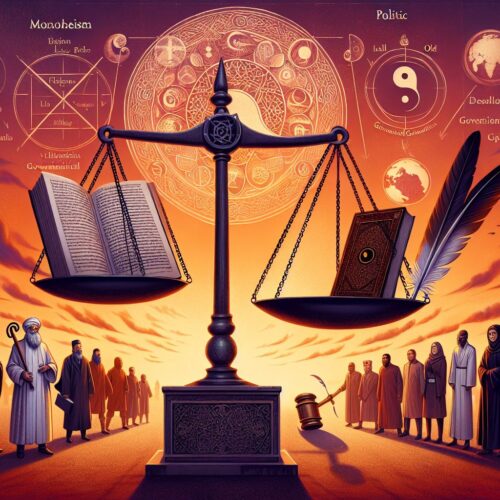In the intricate labyrinth of human existence, few concepts possess the profound capacity to shape our societies as monotheistic beliefs and political ideologies. Although seemingly disparate, these realms intertwine, constructing a delicate web of moral dimensions that warrant closer examination. By delving into the entanglement of monotheism and politics, we can shed light on the intricate balance between spiritual devotion and the power dynamics that drive our world.
Monotheism’s Moral Compass
At its core, monotheism revolves around the belief in a single, all-encompassing deity. This faith system provides a moral compass, guiding adherents in navigating the complexities of life. The values inherent in monotheistic beliefs such as compassion, justice, and equality permeate the political ideologies that emerge within monotheistic societies. As societies are forged, discussions ensue on how to translate these moral teachings into the governance structures that wield power.
Theocracy and Its Pitfalls
The intertwining of monotheism and politics is most evident in the concept of theocracy. Historically, theocratic states have emerged, where religious leaders hold direct influence over political decision-making. The advent of theocracies raises crucial questions about power dynamics, the role of divine authority, and the potential for religious orthodoxy to infringe upon individual freedoms. It is essential to navigate the fine line between upholding moral principles and safeguarding the autonomy of individuals within these systems.
Democratic Principles as a Middle Ground
In contrast to theocratic governance, the pursuit of democratic principles emerges as an alternative paradigm within monotheistic societies. Democracies allow for a pluralistic society, where differing religious beliefs coexist and contribute to the political discourse. However, tensions arise when the majority religious group attempts to enforce its values on others, challenging the fine balance between individual liberties and the preservation of religious traditions. Recognizing the potential for such clashes, societies endeavor to establish frameworks that protect minority rights while upholding core democratic principles.
The Globalization Paradox
In today’s interconnected world, examining the interplay of monotheism and politics necessitates a nuanced perspective. As globalization accelerates, societies are increasingly exposed to diverse belief systems, sparking debates regarding cultural relativism and universal morality. Monotheistic societies grapple with reconciling their age-old traditions with emerging global norms, often grappling with moral dilemmas that arise from this tension. Striking a delicate balance between preserving cultural heritage and embracing global values becomes paramount.
Technological Advancements: A Moral Frontier
Advances in technology introduce another layer of complexity into the intertwining realms of monotheism and politics. From bioethical debates surrounding reproductive technologies to concerns over surveillance and privacy, the moral implications of technological progress challenge monotheistic beliefs and their relation to political decision-making. Navigating these uncharted waters requires introspection, ethical discernment, and a collective dialogue that bridges religion, politics, and technology.
Conclusion: The Never-Ending Quest
The interconnectedness of monotheism and politics is an ever-evolving subject that transcends temporal and geographic boundaries. As we move forward, it becomes increasingly important to critically examine the moral dimensions inherent in our belief systems and how they shape the political structures we inhabit. Recognizing the potential pitfalls of theocracy, striving for democratic inclusivity, negotiating globalization’s challenges, and confronting the ethical frontiers of technology all contribute to a more profound understanding of the dynamic relationship between monotheism and politics. By engaging in enlightened and open discussions, we can hope to foster a harmonious coexistence that respects both our individual liberties and our collective moral foundations.
